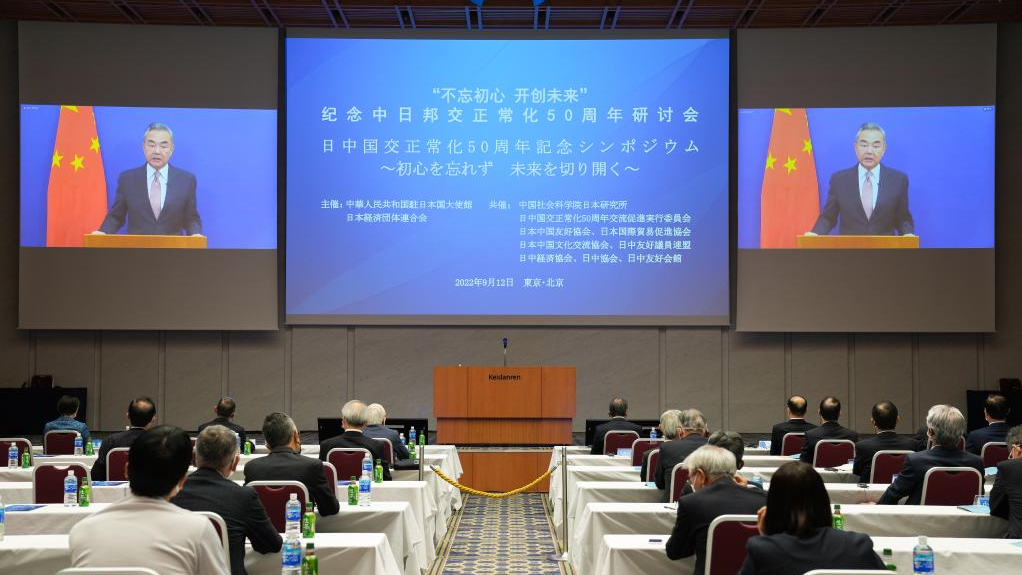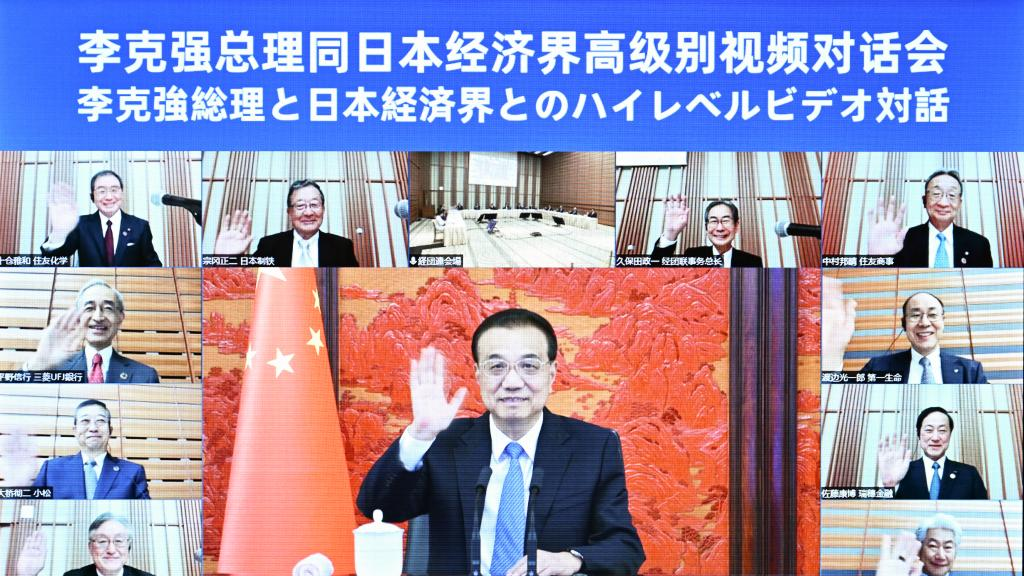
Chinese State Councilor and Foreign Minister Wang Yi delivers a video speech at the opening ceremony of a seminar commemorating the 50th anniversary of the normalization of China-Japan diplomatic relations in Tokyo, Japan, September 12, 2022. /Xinhua
Chinese State Councilor and Foreign Minister Wang Yi delivers a video speech at the opening ceremony of a seminar commemorating the 50th anniversary of the normalization of China-Japan diplomatic relations in Tokyo, Japan, September 12, 2022. /Xinhua
Editor's note: Curtis Stone is an international relations expert, an editor and commentator. The article reflects the author's opinions and not necessarily the views of CGTN.
September 29 marks the 50th anniversary of the normalization of China-Japan diplomatic relations, a symbolic milestone. For over half a century, China and Japan have focused on building beneficial relations for the good of the two countries, the region, and the world, and despite their differences and challenging global conditions, people from both sides continue to build on this foundation.
Nevertheless, the situation is not all roses. Despite the obvious benefits of promoting this relationship, the spirit of that historic moment has been lost to those who fear China's rise and seek to contain it. At 50 years, the bilateral ties are at a crossroads, which begs the question: What next for the two Asian giants?
What had started as a risky diplomatic gamble, during the Cold War period in 1972, has evolved into a fruitful relationship with deep cultural and business ties. The results have proven the correctness of positive engagement, showing that two countries can still cooperate with each other.
In the words of China's State Councilor and Foreign Minister Wang Yi, who on September 12 addressed the opening ceremony of the symposium marking the 50th anniversary of normalization of diplomatic relations between China and Japan via video link, leaders of the older generation of the two countries, against all odds, broke the ice of the Cold War and turned the page in bilateral relations. He reminded us that 50 years ago, both China and Japan viewed stable relations as an essential crux for peace and prosperity.
A lot has changed ever since. After the reform and opening-up policy kicked off over 40 years ago, China grew rapidly and in 2010 overtook Japan as the world's second-largest economy. China's rise has changed the global landscape, and also brought with it countless opportunities for cooperation and development. Today, China and Japan are key trading partners and Japanese trade with China totaled more than $371 billion in 2021, according to data provided by the Ministry of Foreign Affairs of Japan.

Chinese Premier Li Keqiang attends a high-level video dialogue with representatives of the Japanese business community in Beijing, China, September 22, 2022. /Xinhua
Chinese Premier Li Keqiang attends a high-level video dialogue with representatives of the Japanese business community in Beijing, China, September 22, 2022. /Xinhua
Furthermore, people including Japanese entrepreneur Kazuo Inamori, who died in August at the age of ninety, serve as important bridges in the China-Japan relationship. Inamori, who first visited China in 1975 , was well liked by the Chinese. He worked hard to build friendships between the people of the two nations, and others will likely follow in his footsteps. It is on account of these frequent people-to-people and cultural exchanges that promote friendly relations between countries and are exactly what is required to help move relations forward for another 50 years.
Nevertheless, too many people have forgotten the spirit of that crucial moment in history when Beijing and Tokyo forged a new path together, just how far China-Japan relations have come over the past 50 years, and what the diplomatic relationship means for the two countries, as well as for overall peace and prosperity, and instead are allowing Cold War-era thinking to creep back in the equation, which threatens to rot away the hard-won foundation.
Back in June, Japan hosted the Pacific Amphibious Leaders Symposium, which the United States launched in Hawaii in 2015, to foster cooperation among members to help contain China. Not only does this approach threaten to undermine 50 years of progress in China-Japan relations but it risks a return to a ruthless balance-of-power world that will only fuel confrontation between the two biggest economies in the world. It would be bad for everyone, including Japan, which is an old friend of China and an ally to the U.S.-dominated Western alliance system.
As the saying goes, you cannot have your cake and eat it too. As two giants in Asia with a long, complex history together, the China-Japan relations are one of the most important in the world. Accordingly, China and Japan should strive to build more bridges of friendship and form a stronger partnership with each other. Although the world situation is undergoing profound changes, it remains essential to maintain the original aspirations behind the normalization of diplomatic relations.
Therefore, both sides should look forward to the next 50 years of diplomatic relations, in order to look away from the Cold War lens and to focus on the benefits of improving their bilateral ties.
(If you want to contribute and have specific expertise, please contact us at opinions@cgtn.com. Follow @thouse_opinions on Twitter to discover the latest commentaries on CGTN Opinion Section.)

